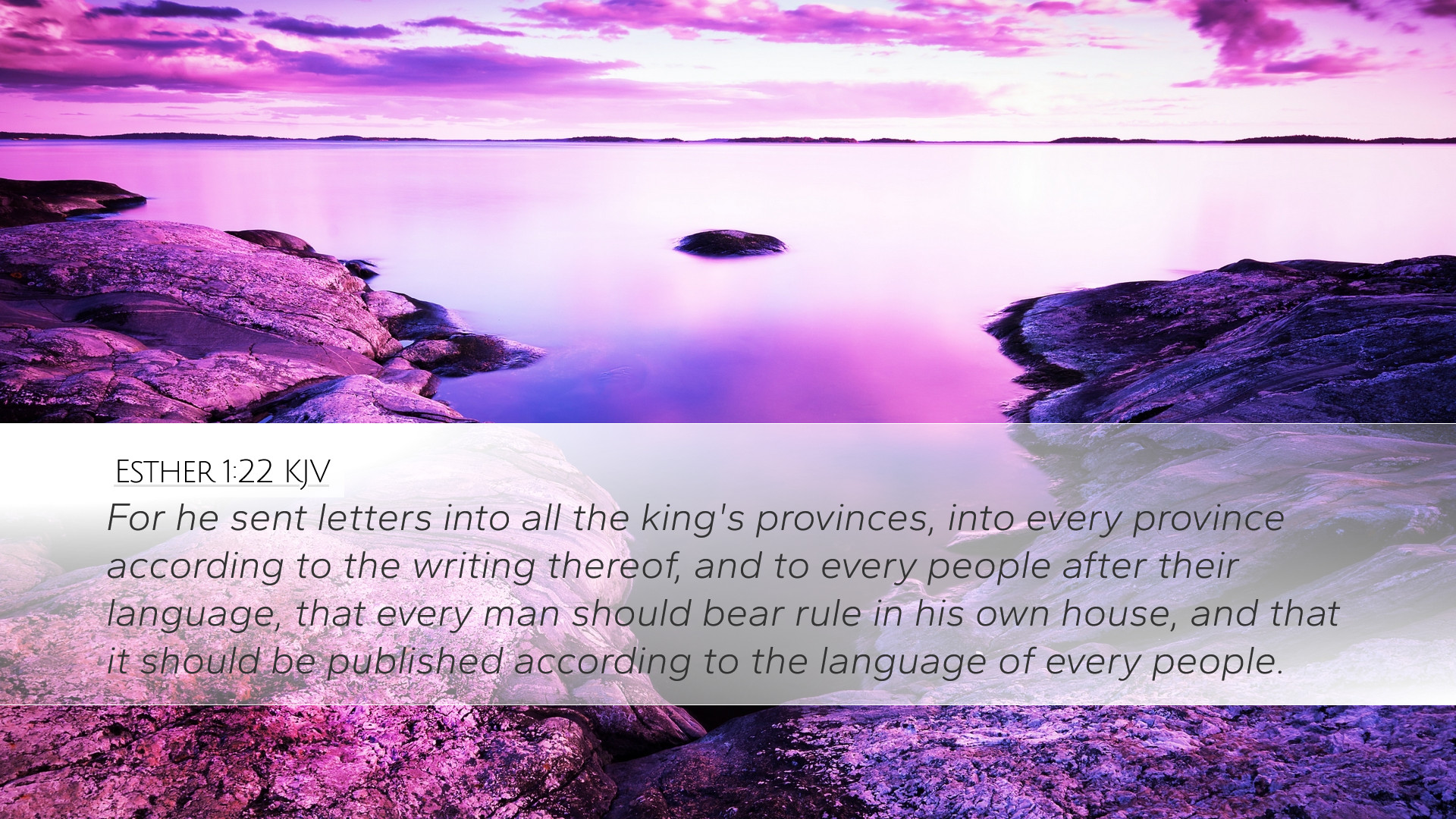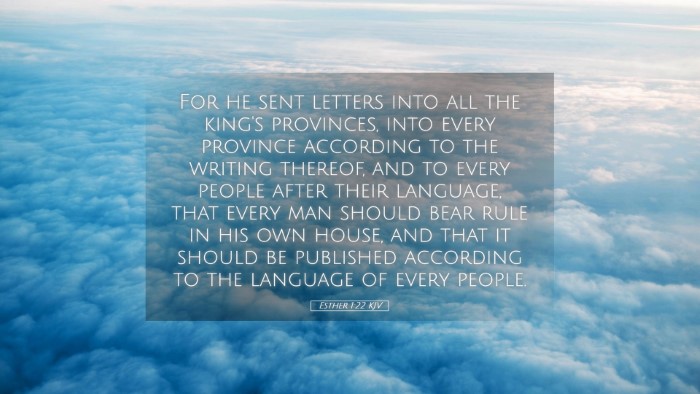Old Testament
Genesis Exodus Leviticus Numbers Deuteronomy Joshua Judges Ruth 1 Samuel 2 Samuel 1 Kings 2 Kings 1 Chronicles 2 Chronicles Ezra Nehemiah Esther Job Psalms Proverbs Ecclesiastes Song of Solomon Isaiah Jeremiah Lamentations Ezekiel Daniel Hosea Joel Amos Obadiah Jonah Micah Nahum Habakkuk Zephaniah Haggai Zechariah MalachiEsther 1:22
Esther 1:22 KJV
For he sent letters into all the king's provinces, into every province according to the writing thereof, and to every people after their language, that every man should bear rule in his own house, and that it should be published according to the language of every people.
Esther 1:22 Bible Commentary
Bible Commentary on Esther 1:22
Esther 1:22 states, "He sent letters into all the king's provinces, into every province according to the writing thereof, and to every people after their language; that every man should bear rule in his own house, and that it should be published according to the language of every people." This verse concludes a significant period in the narrative of Queen Vashti's refusal to comply with King Ahasuerus' decree. The aftermath of her disobedience triggers a series of events leading to Esther's rise as the queen of Persia. A close examination reveals insights about governance, cultural integration, and the domestic sphere.
Historical and Cultural Context
To understand Esther 1:22, it is crucial to consider the historical context surrounding the Persian Empire during Ahasuerus' rule. Matthew Henry emphasizes the vastness of Ahasuerus' realm, which necessitated communication that transcended linguistic barriers. The king's decision to send letters demonstrates both his authority and concern for social order.
Interpretative Insights
Albert Barnes notes that the letters sent into all provinces served not only as a decree of governance but also as an assertion of male authority and domestic order. The instruction for every man to rule in his house reflects the patriarchal society of ancient Persia, where family hierarchy was paramount.
Theological Implications
The verse invites discussion on the theological implications of authority and governance within the domestic space. Adam Clarke posits that the instruction to men to rule in their households aligns with biblical principles of headship. This call to authority should not suggest tyranny but rather a responsible stewardship of family and resources.
Cultural Dynamics
Moreover, the emphasis on language demonstrates an early recognition of multiculturalism within the empire. The directive that it should be published in every language signifies an understanding of the diverse composition of the population. This reflects God's concern for inclusivity and the recognition of diverse cultures within His sovereign plan.
Practical Applications
- Leadership in Households: Contemporary leaders, including pastors and heads of households, can draw parallels to their responsibilities. The notion of governing one's house must emphasize love, service, and mutual respect rather than domination.
- Cultural Sensitivity: In modern ministry, understanding the context and culture of the community is crucial. This verse can inspire leaders to communicate God's message in culturally relevant ways, respecting the linguistic and cultural diversity present today.
- Authority and Responsibility: The concepts of authority and governance within families should be approached with an understanding of biblical principles that focus on sacrificial leadership and the nurturing of family members.
Conclusion
Esther 1:22 serves not only as a historical account but also as a verse rich with principles applicable to modern society. From the aspects of authority and governance within the home to the recognition of cultural diversity, this verse invites deep reflection. Pastors, students, and scholars can glean valuable insights for personal and communal applications, echoing the timeless truths found in Scripture.
Final Thoughts
As we study Esther 1:22 together, let us remember the significance of leadership, the responsibility that comes with authority, and the call to serve others with love and respect. The narratives within Esther remind us of God's providence and the overarching theme of His sovereign control over the affairs of humanity.


